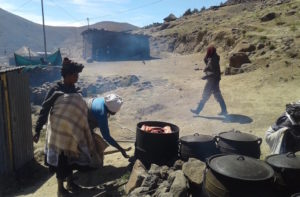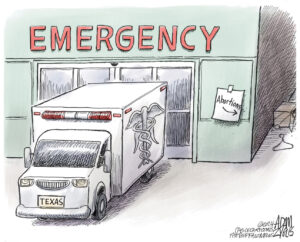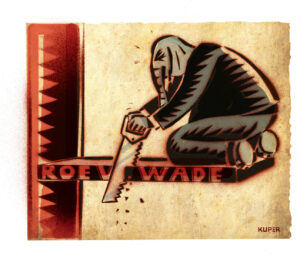Illegal Abortions Exact a High Toll Among African Women
Unsafe procedures are killing women at high rates, and U.S. policy is part of the problem. Residents of Lebeko, a rural village in Lesotho prepare for the funeral of Nontsikelo Njuza. The 21-year-old died from complications of an illegal abortion. (Photo courtesy of the Njuza family)
Residents of Lebeko, a rural village in Lesotho prepare for the funeral of Nontsikelo Njuza. The 21-year-old died from complications of an illegal abortion. (Photo courtesy of the Njuza family)
 Photo Essay
Click here to see photos of Nontsikelo Njuza, her mother and fellow villagers.
Photo Essay
Click here to see photos of Nontsikelo Njuza, her mother and fellow villagers.
Truthdig is proud to present this article as part of its Global Voices: Truthdig Women Reporting, a series from a network of female correspondents around the world who are dedicated to pursuing truth within their countries and elsewhere.
LESOTHO — Nomathemba Njuza will never forget the traumatic loss she suffered on Aug. 23 last year. Two young women showed up at her family home in rural Lesotho with their schoolmate, Njuza’s 21-year-old daughter Nontsikelo, who was in severe pain. Nontsikelo’s friends said their teacher had asked them to bring her back from school.
Njuza called neighbors for help because Nontsikelo was suffering from piercing cramps and heavy bleeding. “I hired a van to take her to a clinic, and by the time we arrived, she was lying in a pool of blood,” Njuza says. Nontsikelo’s condition was so severe she had to be transferred to a hospital 30 miles away. She died during the trip there.
Njuza knows exactly what killed her daughter. On the way to the clinic, Nontsikelo said she had taken an abortion pill from a man she found on Facebook.
Nontsikelo was the victim of an unsafe abortion—one performed by an unskilled practitioner or in a substandard medical environment. Her story is a common one in Africa, where more than 4 million unsafe abortions are performed each year. One out of every 150 African women who have an unsafe abortion dies from complications, and countless others come away scarred physically or emotionally.
As in many other southern African countries, abortion is illegal in Lesotho unless the woman’s health is in danger or the pregnancy is the result of rape. If a woman gets pregnant but can’t care for a child psychologically or financially, she has very little option but to undergo a clandestine abortion that might be life-threatening.
Changing the law is essential but isn’t a cure-all, as the experience in South Africa shows. In that country (which encircles Lesotho), abortion is allowed by law, but many women can’t access a legal procedure. Several factors stand in the way, including cultural or religious beliefs as well as interference from halfway around the globe. A United States government policy reinstated by President Trump blocks federal funding worldwide to nongovernmental organizations that provide any kind of abortion service including advocacy, referral and counseling.
Finding Abortions on Facebook
In Lesotho, a predominantly Catholic country, women who get abortions face social ostracism as well as arrest. Leaving Lesotho to have the procedure isn’t an option for most women. In interviews with this reporter, several women have said they know that safe, legal abortion is available in South Africa, but they can’t afford the private doctors’ fees in that country.
The social, legal and financial barriers lead many women to Facebook, the dominant social media website in Lesotho, where they make contact with unskilled clinicians. Such practitioners are easily accessible and charge more affordable rates to perform abortions.
Various methods are used in these unsafe procedures, with one of the most common involving “abortion pills” that induce labor. These pills, used “off label,” can cause incomplete abortion, which often leads to dangerous bleeding. Other illegal termination methods include ingesting dangerous substances such as brake fluid or bleach.
Complications from unsafe abortions cause a shocking number of deaths among women in Africa compared with other parts of the world. The World Health Organization reports that “in developed regions, it is estimated that 30 women die for every 100,000 unsafe abortions. That number rises to 220 deaths per 100,000 unsafe abortions in developing regions and 520 deaths per 100,000 unsafe abortions in sub-Saharan Africa.”
In Lesotho, it is difficult to pinpoint the number of deaths from unsafe abortion because women who enter hospitals with complications often don’t admit they have had the procedure.
Recently, Lesotho’s Minister of Health, Nkaku Kabi, announced that Queen Mamohato Memorial Hospital, the country’s only referral hospital, is filled to capacity with women suffering from the effects of unsafe abortions. (Other hospitals or clinics that lack proper resources refer patients to this hospital.)
Illegal abortions can result in a range of life-threatening complications, according to Matsebo Mpeta, a nurse-clinician at the referral hospital. Some women develop sepsis, a dangerous response to an infection often caused by the material used in the procedure or by an unclean clinical environment. Other women die from infection itself, loss of blood or harm to the organs or genital tract.
Those who survive unsafe abortions often face serious and lasting health consequences. Women can become infertile if the uterus is damaged—or has to be removed—due to chemicals or instruments used to terminate the pregnancy. Urine or stool incontinence caused by injury to organs is another common lifelong consequence.
Damage to Mental Health
Mpeta also reports mental health issues associated with unsafe abortion, including depression, anxiety attacks and suicidal tendencies. She has seen women and girls become severely traumatized, and she describes some as “mentally challenged” after their experiences.
Puseletso Lekhafola (a pseudonym) had an illegal abortion in Lesotho five years ago, and she is still in anguish. She says she hasn’t been able to grieve—or even process her experience—because she does not feel safe in confiding in anyone.
“It makes you the mother of the dead child, and I have always considered myself a murderer,” Lekhafola says. “Constant questions coming to my mind (are) ‘Will I be able to conceive again?’ and ‘What if God will punish me by not (letting me have) kids again?’ ” Because of the stigma associated with abortion, she has not gone to a counselor for help and has not asked a health professional whether she is able to have children.
In several cases, pregnant women have been too frightened to get illegal abortions so they have had their babies and then committed another crime of despair called concealment. The Lesotho Penal Code states: “A person who disposes of the dead body of a new-born child with intent to conceal the fact of its birth, whether the child died before, during, or after birth commits an offence.”
Magistrate Mapitso Leseeo has handled several cases involving charges of concealment. She tells of one young woman driven to desperation by economic problems and social pressure. “[She] was in her early 30s and was in tears when she described … why she committed the crime,” Leseeo says. “She could not provide for the child, and the father of the child was nowhere to be found.”
South Africa
Although abortion has been legalized in neighboring South Africa, of the estimated 260,000 abortions performed there each year about half are illegal.
On paper, the country has taken an important step toward respecting the rights of women, but observers say the reality is a different story. Many qualified South African health care professionals refuse to perform abortions because it violates their cultural or religious beliefs. These practitioners can refuse to perform the procedure if they conscientiously object to it, but they are legally bound to refer patients to safe abortion providers. According to Amnesty International, this guideline isn’t well regulated and the result is lack of access to safe procedures.
Economic and geographic factors also make it difficult for women to access safe abortions. Most South African health care professionals work in the private sector, leaving a dearth of available doctors in public health centers, which are the only affordable option for much of the population. Compounding the problem, women in rural areas have little access to safe terminations because they lack transportation to appropriate facilities.
Global Gag Rule
A United States policy makes it even harder to find safe abortions in southern Africa. Known as the “Global Gag Rule,” this policy blocks U.S. aid to nongovernmental agencies that offer any services related to abortion.
The policy, first implemented by President Reagan in 1984, has been rescinded by Democratic administrations and reinstated by Republican ones. President Obama revoked it, and in 2017 President Trump revived and expanded it. In the past, the policy only applied to U.S. family planning and affected about $575 million in funding, according to Human Rights Watch. Under the Trump administration, the policy now affects about $8.8 billion in global spending. Among other consequences, women in developing countries such as South Africa face less access to information, contraception and legal abortion.
The gag rule also has affected services in countries where abortion is illegal. Health practitioners in Lesotho who used to offer free contraceptives, family planning advice and abortion counseling no longer have the funding to continue. Since Trump’s expansion of the U.S. policy, family planning groups have had to radically downsize outreach efforts as well as services within their facilities.
A Mother’s Scar
Nomathemba Njuza’s daughter Nontsikelelo died two months before taking a final examination that would have determined her educational and career possibilities. Instead of having hopes for a child with a bright future, Njuza says she’s left only with a scar in her heart.
Before Nontsikelelo’s death, Njuza was among those who opposed abortion on moral grounds. She had heard of other young women in the area who had illegally terminated pregnancies, but she hadn’t known any who had died. Nontsikelelo’s death radically changed her attitude.
“Women and girls are in need of safe abortion to save their lives,” Njuza says. “I have come to understand abortion as a medical necessity because it … has a very real impact on people’s lives. I have witnessed that.”
Your support matters…Independent journalism is under threat and overshadowed by heavily funded mainstream media.
You can help level the playing field. Become a member.
Your tax-deductible contribution keeps us digging beneath the headlines to give you thought-provoking, investigative reporting and analysis that unearths what's really happening- without compromise.
Give today to support our courageous, independent journalists.






You need to be a supporter to comment.
There are currently no responses to this article.
Be the first to respond.